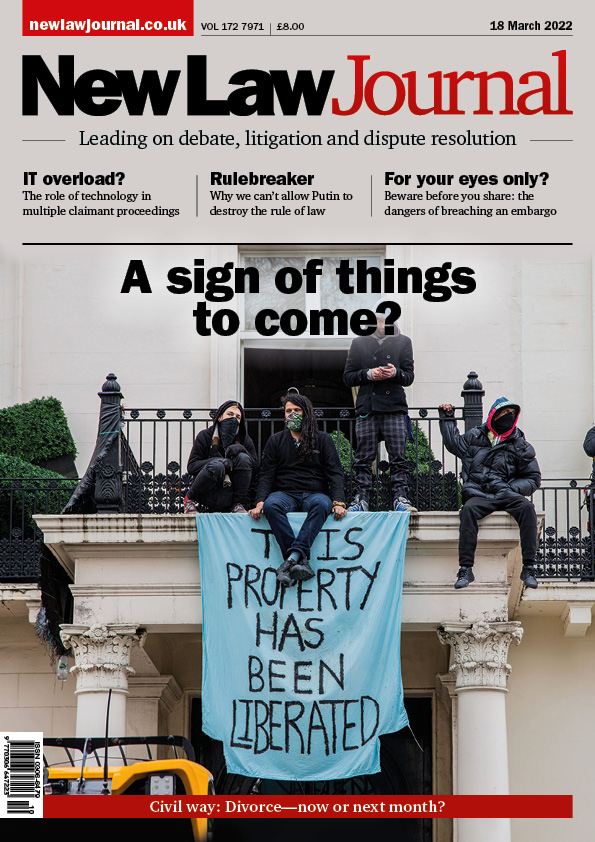THIS ISSUE

Dominic Regan reports on a court divided, a false start & a triumphant underdog
It seems the campaign for divorce reform has been waged for years if not decades, but has its time finally arrived? Perhaps this summer’s separating couples will get lucky?
Beware before you share: Neil Parpworth on draft judgments & the dangers of breaching an embargo
Sofie Edwards, James Bickley & Leon Major discuss the role of technology in multiple claimant proceedings
Divorce: now or next month? CPR treatment
Post-Jogee, the failure of the courts to get to grips with the iniquity of joint enterprise is shocking, says Jon Robins
Nicholas Dobson reviews the recent challenge to the appointment of Dido Harding as chair of Test & Trace
Nick Vamos suggests the home secretary sailed close to the wind when trying to delay Michael Lynch’s extradition
Lawyers face a complex task on sanctions compliance, writes Frank Maher
MOVERS & SHAKERS

NLJ Career Profile: Ken Fowlie, Stowe Family Law
Ken Fowlie, chairman of Stowe Family Law, reflects on more than 30 years in legal services after ‘falling into law’

Gardner Leader—Michelle Morgan & Catherine Morris
Regional law firm expands employment team with partner and senior associate hires

Freeths—Carly Harwood & Tom Newton
Nottinghamtrusts, estates and tax team welcomes two senior associates
NEWS
Children can claim for ‘lost years’ damages in personal injury cases, the Supreme Court has held in a landmark judgment
The Supreme Court has drawn a firm line under branding creativity in regulated markets. In Dairy UK Ltd v Oatly AB, it ruled that Oatly’s ‘post-milk generation’ trade mark unlawfully deployed a protected dairy designation. In NLJ this week, Asima Rana of DWF explains that the court prioritised ‘regulatory clarity over creative branding choices’, holding that ‘designation’ extends beyond product names to marketing slogans
From cat fouling to Part 36 brinkmanship, the latest 'Civil way' round-up is a reminder that procedural skirmishes can have sharp teeth. NLJ columnist Stephen Gold ranges across recent decisions with his customary wit
Digital loot may feel like property, but civil law is not always convinced. In NLJ this week, Paul Schwartfeger of 36 Stone and Nadia Latti of CMS examine fraud involving platform-controlled digital assets, from ‘account takeover and asset stripping’ to ‘value laundering’
Lasting powers of attorney (LPAs) are not ‘set and forget’ documents. In this week's NLJ, Ann Stanyer of Wedlake Bell urges practitioners to review LPAs every five years and after major life changes







